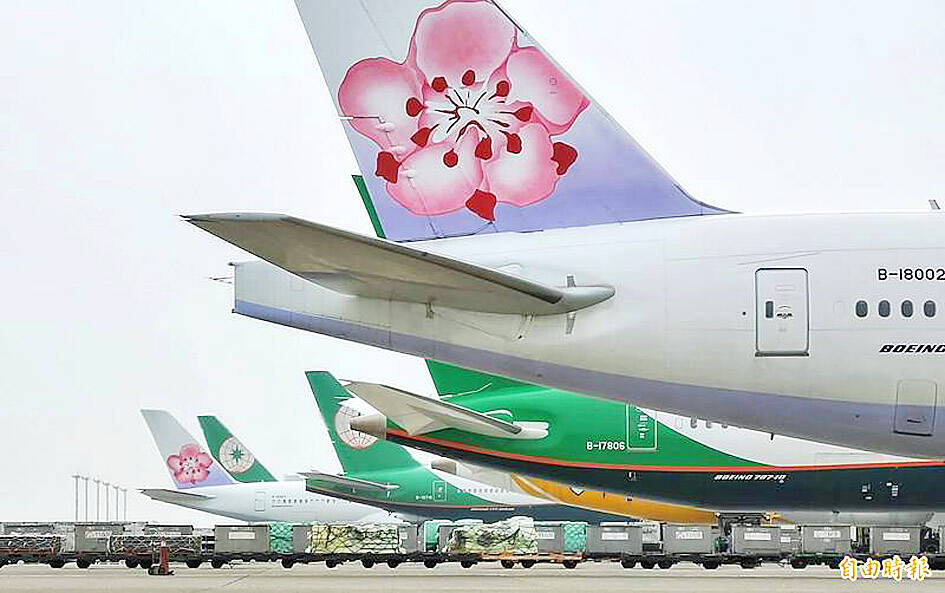China Airlines Ltd (中華航空) yesterday said it would pay its employees year-end bonuses of five months salary, plus a one-time cash reward of NT$20,000 (US$642) and an average salary increase of 4 percent.
The plan was approved at a board meeting yesterday, the company said in a statement.
China Airlines' consolidated sales were NT$184.82 billion last year, up 22.62 percent year-on-year, the company said.

Photo: Tony Yao, Taipei Times
The outlook for this year appears optimistic, it said, adding that booking rates for popular slots during the Lunar New Year holiday and winter break have already surpassed 80 percent.
Thanks to significant increases in revenue fueled by the demand for post-COVID-19 pandemic air travel, several other carriers have also announced salary increases and other forms of remuneration for employees after reporting higher revenue for last year compared with the previous year.
EVA Airways Corp (長榮航空) last month said that it would pay its employees year-end bonuses of six months salary, the highest since the company was founded, as well as a mid-year bonus to be paid later this year.
As well as the additional payments, which would apply to airline employees and those working in its subsidiaries, crew and ground staff would also receive an average monthly pay increase of NT$5,000, and pilots would get an additional NT$11,000 to NT$20,000 depending on their rank, EVA Airways said.
The airline's consolidated revenue last year rose 45.11 percent from a year earlier to NT$200.36 billion, a record high, with passenger revenue alone increasing by 326.01 percent from a year earlier.
Tigerair Taiwan Ltd (台灣虎航) has unveiled plans to give its workers year-end bonuses of two months salary. Along with the additional one month already distributed and another to be paid at the end of the year, employees are set to receive additional compensation of four months salary, it said.
The company's consolidated revenue last year surged by 848.29 percent year-on-year to NT$12.47 billion. It attributed the strong growth to its sales performance in the fourth quarter of last year, which soared to an all-time high thanks to a strong travel interest in Northeast Asia.
Starlux Airlines Co (星宇航空) plans to provide a one-month bonus and a salary increase of NT$2,000, plus an additional transport allowance of NT$1,000, the start-up said.
It reported consolidated revenue last year jumped 568.39 percent year-on-year to NT$22.47 billion.
This year, the airline aims to aggressively expand its flight network, connecting new destinations such as Chiang Mai, Thailand and Hakodate, Japan, it said.
This story has been updated since it was first published to add airlines' revenue information for last year.

IN THE AIR: While most companies said they were committed to North American operations, some added that production and costs would depend on the outcome of a US trade probe Leading local contract electronics makers Wistron Corp (緯創), Quanta Computer Inc (廣達), Inventec Corp (英業達) and Compal Electronics Inc (仁寶) are to maintain their North American expansion plans, despite Washington’s 20 percent tariff on Taiwanese goods. Wistron said it has long maintained a presence in the US, while distributing production across Taiwan, North America, Southeast Asia and Europe. The company is in talks with customers to align capacity with their site preferences, a company official told the Taipei Times by telephone on Friday. The company is still in talks with clients over who would bear the tariff costs, with the outcome pending further

WEAKER ACTIVITY: The sharpest deterioration was seen in the electronics and optical components sector, with the production index falling 13.2 points to 44.5 Taiwan’s manufacturing sector last month contracted for a second consecutive month, with the purchasing managers’ index (PMI) slipping to 48, reflecting ongoing caution over trade uncertainties, the Chung-Hua Institution for Economic Research (CIER, 中華經濟研究院) said yesterday. The decline reflects growing caution among companies amid uncertainty surrounding US tariffs, semiconductor duties and automotive import levies, and it is also likely linked to fading front-loading activity, CIER president Lien Hsien-ming (連賢明) said. “Some clients have started shifting orders to Southeast Asian countries where tariff regimes are already clear,” Lien told a news conference. Firms across the supply chain are also lowering stock levels to mitigate

NEGOTIATIONS: Semiconductors play an outsized role in Taiwan’s industrial and economic development and are a major driver of the Taiwan-US trade imbalance With US President Donald Trump threatening to impose tariffs on semiconductors, Taiwan is expected to face a significant challenge, as information and communications technology (ICT) products account for more than 70 percent of its exports to the US, Chung-Hua Institution for Economic Research (CIER, 中華經濟研究院) president Lien Hsien-ming (連賢明) said on Friday. Compared with other countries, semiconductors play a disproportionately large role in Taiwan’s industrial and economic development, Lien said. As the sixth-largest contributor to the US trade deficit, Taiwan recorded a US$73.9 billion trade surplus with the US last year — up from US$47.8 billion in 2023 — driven by strong

RESHAPING COMMERCE: Major industrialized economies accepted 15 percent duties on their products, while charges on items from Mexico, Canada and China are even bigger US President Donald Trump has unveiled a slew of new tariffs that boosted the average US rate on goods from across the world, forging ahead with his turbulent effort to reshape international commerce. The baseline rates for many trading partners remain unchanged at 10 percent from the duties Trump imposed in April, easing the worst fears of investors after the president had previously said they could double. Yet his move to raise tariffs on some Canadian goods to 35 percent threatens to inject fresh tensions into an already strained relationship, while nations such as Switzerland and New Zealand also saw increased